外研版(2019) 必修 第一册 Unit 2 Exploring English Developing ideas(45张PPT)
文档属性
| 名称 | 外研版(2019) 必修 第一册 Unit 2 Exploring English Developing ideas(45张PPT) |  | |
| 格式 | zip | ||
| 文件大小 | 2.7MB | ||
| 资源类型 | 教案 | ||
| 版本资源 | 外研版(2019) | ||
| 科目 | 英语 | ||
| 更新时间 | 2023-02-09 15:50:04 | ||
图片预览

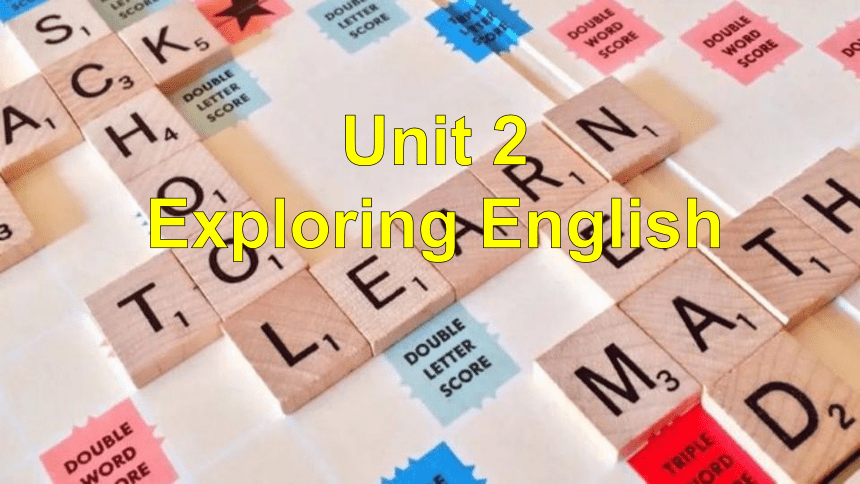

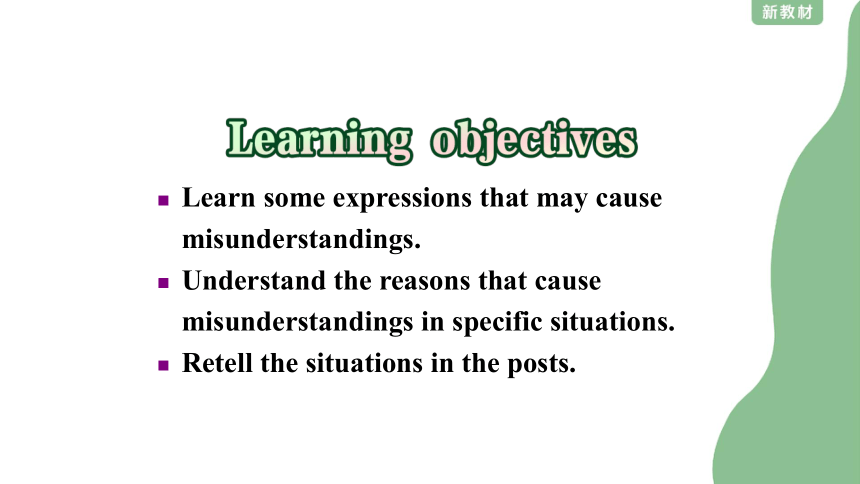

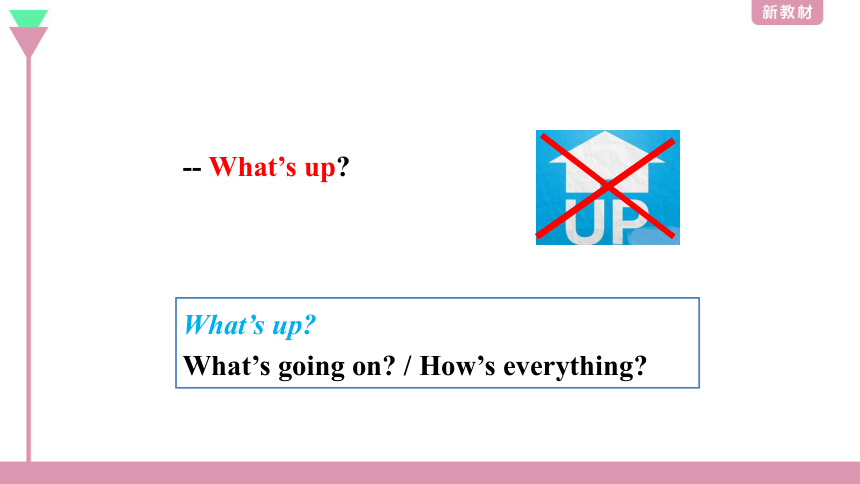
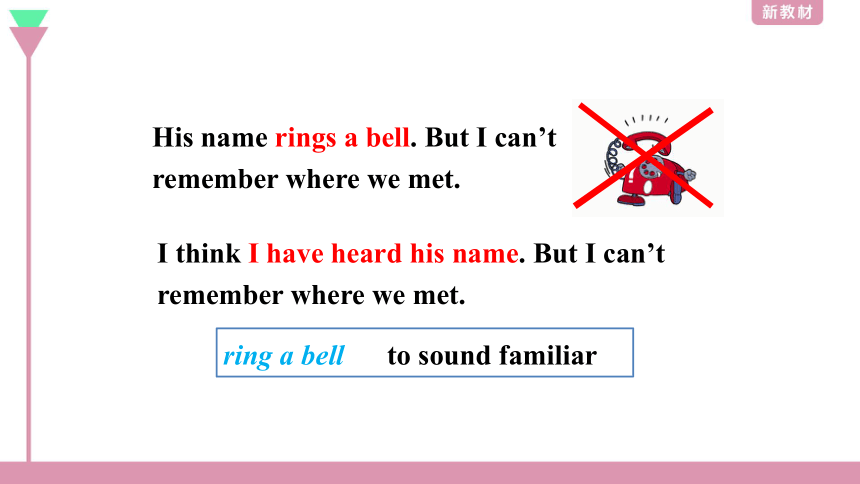
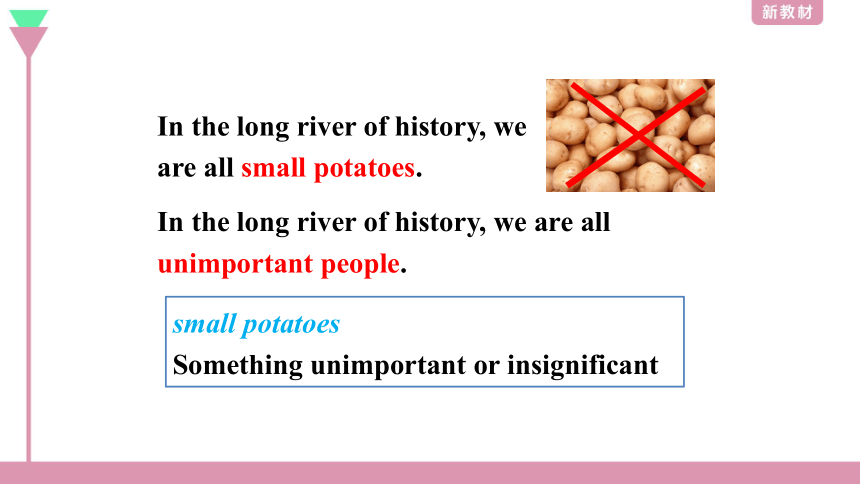
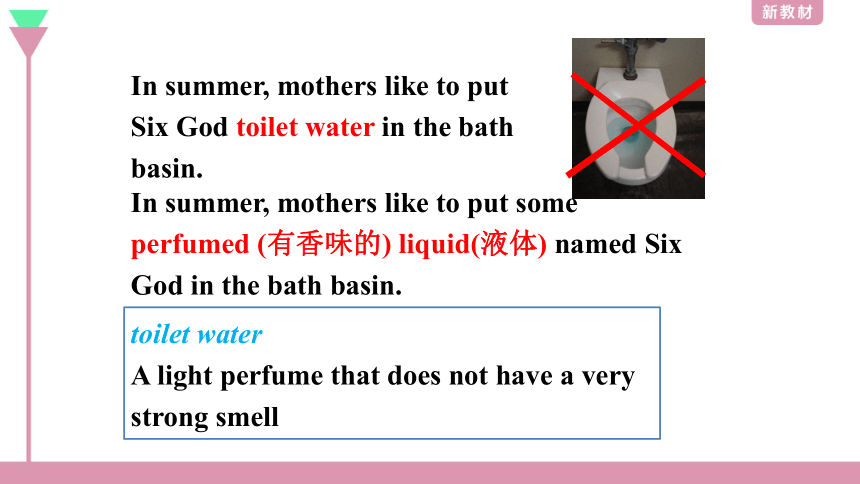
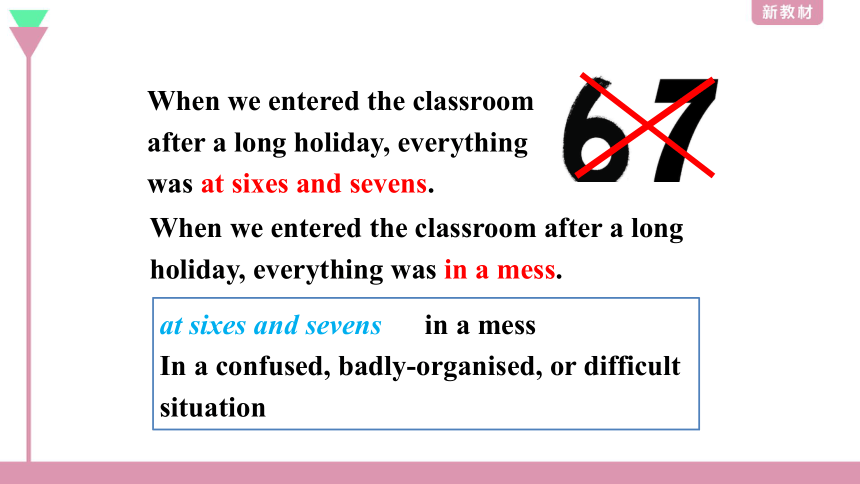
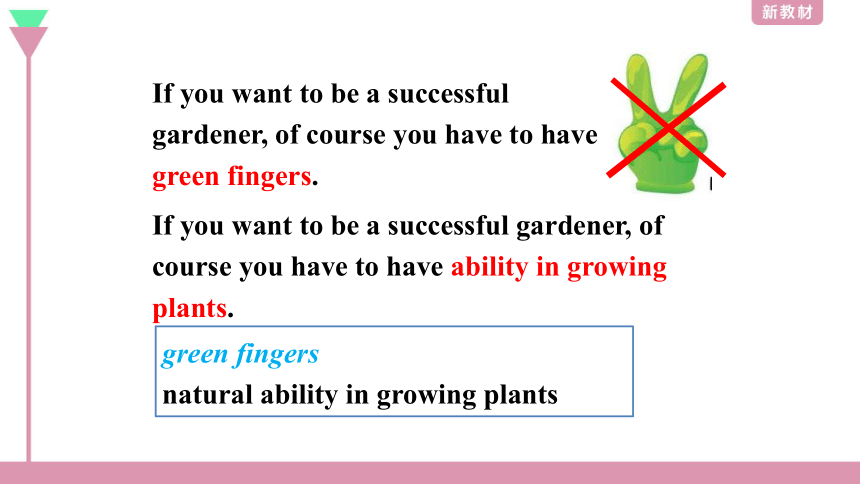
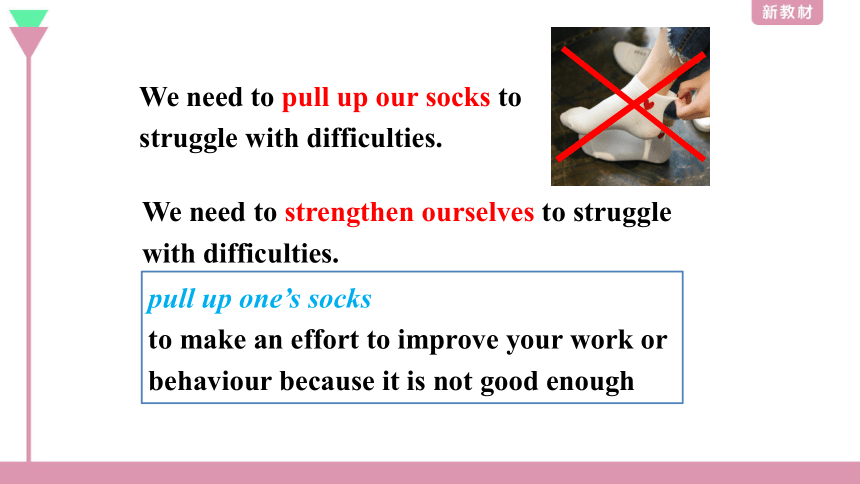
文档简介
(共45张PPT)
Unit 2
Unit 2
Exploring English
Learn some expressions that may cause misunderstandings.
Understand the reasons that cause misunderstandings in specific situations.
Retell the situations in the posts.
Read the following expressions and guess their meanings.
What’s up
ring a bell
small potatoes
toilet water
at sixes and sevens
green fingers
put up one’s socks
-- What’s up
What’s up
What’s going on / How’s everything
His name rings a bell. But I can’t remember where we met.
I think I have heard his name. But I can’t remember where we met.
ring a bell to sound familiar
In the long river of history, we are all small potatoes.
In the long river of history, we are all unimportant people.
small potatoes
Something unimportant or insignificant
In summer, mothers like to put Six God toilet water in the bath basin.
In summer, mothers like to put some perfumed (有香味的) liquid(液体) named Six God in the bath basin.
toilet water
A light perfume that does not have a very strong smell
When we entered the classroom after a long holiday, everything was at sixes and sevens.
When we entered the classroom after a long holiday, everything was in a mess.
at sixes and sevens in a mess
In a confused, badly-organised, or difficult situation
If you want to be a successful gardener, of course you have to have green fingers.
If you want to be a successful gardener, of course you have to have ability in growing plants.
green fingers
natural ability in growing plants
We need to pull up our socks to struggle with difficulties.
We need to strengthen ourselves to struggle with difficulties.
pull up one’s socks
to make an effort to improve your work or behaviour because it is not good enough
forum
resource
misadventure
remind
rather
comment
frog
throat
have a frog in one's throat
n. (因特网上的)论坛,讨论区
n. 资料,教学资源
n. 事故,灾难
v. 提醒,使......想起
adv. 相当,颇
n. 评论
n. 蛙, 青蛙
n. 喉咙,咽喉
(尤因喉咙痛)说话困难
downtown
boot
entrance
section
exit
actually
downstairs
wicked
odd
adj. 在城镇中心区的,
在闹市区的
n. 靴子
n. 大门(口), 入口(处)
n. 区域
n. 出口
adv. 事实上;实际上
adv. 在楼下
adj. 缺德的,邪恶的;
很棒的,极好的
adj. 奇特的;古怪的
negative
error
intend
informal
recognise
base
aware
be aware of
adj. 消极的,负面的
n. 错误,谬误
v. 计划,打算
adj. (书写或言谈)非正式的
v. 认识,辨认
v. 以......为基础
adj.意识到的,明白的
意识到,察觉到
Do you know the following signs’ meaning
approve
comment
share
favorite
Quickly go through the passage and finish task 1.
Task
1
Read the four posts (帖子)quickly and find out what puzzled Yancy, Sophie, Julien and Zheng Xu
She had a frog in her throat.
the ground floor / the first floor
wicked
Not bad
Check your answers!
第二遍 精读提素养
步骤一|先明文章主旨大意,知写了什么
The passage is mainly about .
A.an exciting adventure in English learning
B.some strange English words difficult to learn
C.the differences between some English in class and in life
D.some funny posts about what we should learn in class
答案:C
步骤二|再逐段精读文章,看怎样写的
阅读文章第1段,完成下列题目
1.What did the forum collect last week
2.Is some of the English learned in the classroom same as that in the outside world
Funny or strange storiesaboutusingEnglish.
No, it isn't.
阅读文章第2、3段,完成下列题目
1.文意的理解
(1)Write T (true) or F (false).
①It is said that British are always careful about their food. ( )
②Maggie ate a big frog. ( )
③When Sophie first visited New York, she wanted to buy a pair of winter shoes. ( )
④The lady at the entrance gave Sophie the wrong information. ( )
T
F
F
F
(2)What does Yancy think of the British attitude towards their food
A.Doubtful. B.Supportive.
C.Helpless. D.Hopeful.
答案:A
阅读文章第4、5段,完成下列题目
1.文意的理解
(1)In fact, Julien found his penfriend's grandfather .
A.wicked B.confused C.negative D.nice
答案:D
(2)What do we learn about Zheng Xu's English paper
A.Zheng Xu felt disappointed about his paper.
B.Zheng Xu didn't get a good grade on it.
C.The teacher thought the paper wrote well.
D.The teacher thought Zheng Xu was not a bad student.
答案:C
1. Not only can you post specific questions, but you can
also broaden your knowledge by reading posts from
other English learners around the world.
not only位于句首,后接句子时,其所在的分句要用倒
装结构。
e.g. Not only is she a teacher, but she is
also a writer.
在英语中,为了避免产生头重脚轻、结构不平衡的句子,我们常采用倒装语序,遵循“尾重原则”,即把句子最复杂的成分放在句尾以保持句子平衡。
e.g. Gone are the days when they had nothing to
eat.
Only then did he realize that he was wrong.
【语境应用】单句语法填空。
1) As an exchange student, not only______
you good at writing in English, but also you
study well and live a healthy life.
2) Not until then _______ I realize words
could be powerful in positive and negative
ways.
are
did
2. Here are some of our favourites, to
remind us that some of the English we
learn in the classroom is rather different
from the English in the outside world!
remind vt.
to make someone remember something
that they must do提醒
to make someone remember someone that they know or
something that happened in the past 使(某人)想起
【归纳】
remind sb. of sth. 提醒某人某事
remind sb. to do sth. 提醒某人做某事
remind (sb.) that/ how/ what… 提醒某人……
【拓展】动词+sb.of sth.
warn sb. of sth. 提醒/警告某人某事
inform sb. of sth. 告知某人某事
convince sb. of sth. 使某人相信某事
【语境应用】完成句子。
1) You ________ ________ ________
________ ________ (使我想起了你的父亲)
when you say that.
2) Please ________ ________ ________
________ ________ ________ (提醒我发这
封邮件) this afternoon.
remind me of
your father
remind me to
send the email
3) (2019北京卷) On the outing, she was offered a
candy bar. However, her dad reminded her _____
sugary treats were bad for her teeth.
that
3. People say that the British always play
safe with what they eat.
句中what引导的宾语从句,作介词with
的宾语,“……的事/人”,相当于the
thing(s) / the person(s) that…。
e.g. We are proud of what we have achieved.
注意:
(1) what引导名词性从句时,what在从句中
作主语、宾语或表语;而that引导名词性
从句时,that只起连接作用,不作任何句
子成分。that引导宾语从句时常可省略,
但在主语从句、表语从句和同位语从句
中一般不能省略。
(2) 介词后一般不接that引导的宾语从句。
4. At the information desk at the entrance, I
asked a lady where the shoe section was.
entrance n. 大门(口),入口(处)
a door, gate etc that you go through to
enter a place
the entrance to ……的入口
通常与介词to搭配的短语
the key to the door 门的钥匙
the answer to the question 问题的答案
the home to the animal 动物的家园
the solution to the problem 问题的解决方法
entrance n. 进入;进入权;(俱乐部、社团、大学等的)准许加入
the right or ability to go into a place; permission to become a member of or become involved in a profession, university, society etc
gain entrance to 得以进入……;获得……
的进入权
entrance examinations 入学考试
【语境应用】完成句子。
1) There is no possibility that all the students
can ________________________________
__________________ (通过大学入学考试).
2) I can’t find _____________ (入口) the park.
3) (2019 浙江卷) But can uniforms help improve
school standards The answer _____ this
question is not clear.
pass the college/ university entrance examination
the entrance to
to
5. I saw that shoes were actually sold
downstairs on the ground floor…
actually adv. 实际上,事实上
used to emphasize the real or exact truth of a
situation, rather than what people may think
e.g. In the original story, the king didn’t
actually wear clothes.
“事实上,实际上”其他表达:
in fact, as a matter of fact, in reality, in effect
6. morally wrong and intending to hurt
people
intend v. 想要, 打算, 计划
to have something in your mind as a
plan or purpose
【归纳】
intend
用法
拓展
be intended for sb. / sth.
是为某人/某物而设计的
have no intention of doing sth.
无意做某事; 不打算做某事
intention n. 意图, 目的; 打算
intend sb. to do sth. 打算让某人做某事
intend that… 打算……
intend to do/doing sth. 打算做某事
【语境应用】单句填空。
1) The university is known for its language and
culture courses _________ (intend) for
international students. (2018 北京)
2) I have no __________ (intend) of retiring
just yet.
汉译英。
3) 我打算在那儿过夜。
intended
intention
I intend to spend the night there.
expressions surface meaning real meaning
frog in the throat an animal in the throat a dry or blocked throat
the first floor the first counted from the ground the second counted from the ground
wicked morally wrong behavior very good; fantastic
not bad not successful pretty good
1. Which post do you find most interesting Why
2. How would you deal with the situations described in the posts
Open.
Open.
3. What examples of Internet language are used in the passage What do they mean
4. Do you know of any Chinese expressions that often cause misunderstandings for people from other countries Share them with the class.
COZ: because; X-( angry; :-(sad
Open.
Work in pairs. Retell the situations in the four posts.
Think of a story about a misunderstanding that happened in your life. Then organize it in English.
Unit 2
Unit 2
Exploring English
Learn some expressions that may cause misunderstandings.
Understand the reasons that cause misunderstandings in specific situations.
Retell the situations in the posts.
Read the following expressions and guess their meanings.
What’s up
ring a bell
small potatoes
toilet water
at sixes and sevens
green fingers
put up one’s socks
-- What’s up
What’s up
What’s going on / How’s everything
His name rings a bell. But I can’t remember where we met.
I think I have heard his name. But I can’t remember where we met.
ring a bell to sound familiar
In the long river of history, we are all small potatoes.
In the long river of history, we are all unimportant people.
small potatoes
Something unimportant or insignificant
In summer, mothers like to put Six God toilet water in the bath basin.
In summer, mothers like to put some perfumed (有香味的) liquid(液体) named Six God in the bath basin.
toilet water
A light perfume that does not have a very strong smell
When we entered the classroom after a long holiday, everything was at sixes and sevens.
When we entered the classroom after a long holiday, everything was in a mess.
at sixes and sevens in a mess
In a confused, badly-organised, or difficult situation
If you want to be a successful gardener, of course you have to have green fingers.
If you want to be a successful gardener, of course you have to have ability in growing plants.
green fingers
natural ability in growing plants
We need to pull up our socks to struggle with difficulties.
We need to strengthen ourselves to struggle with difficulties.
pull up one’s socks
to make an effort to improve your work or behaviour because it is not good enough
forum
resource
misadventure
remind
rather
comment
frog
throat
have a frog in one's throat
n. (因特网上的)论坛,讨论区
n. 资料,教学资源
n. 事故,灾难
v. 提醒,使......想起
adv. 相当,颇
n. 评论
n. 蛙, 青蛙
n. 喉咙,咽喉
(尤因喉咙痛)说话困难
downtown
boot
entrance
section
exit
actually
downstairs
wicked
odd
adj. 在城镇中心区的,
在闹市区的
n. 靴子
n. 大门(口), 入口(处)
n. 区域
n. 出口
adv. 事实上;实际上
adv. 在楼下
adj. 缺德的,邪恶的;
很棒的,极好的
adj. 奇特的;古怪的
negative
error
intend
informal
recognise
base
aware
be aware of
adj. 消极的,负面的
n. 错误,谬误
v. 计划,打算
adj. (书写或言谈)非正式的
v. 认识,辨认
v. 以......为基础
adj.意识到的,明白的
意识到,察觉到
Do you know the following signs’ meaning
approve
comment
share
favorite
Quickly go through the passage and finish task 1.
Task
1
Read the four posts (帖子)quickly and find out what puzzled Yancy, Sophie, Julien and Zheng Xu
She had a frog in her throat.
the ground floor / the first floor
wicked
Not bad
Check your answers!
第二遍 精读提素养
步骤一|先明文章主旨大意,知写了什么
The passage is mainly about .
A.an exciting adventure in English learning
B.some strange English words difficult to learn
C.the differences between some English in class and in life
D.some funny posts about what we should learn in class
答案:C
步骤二|再逐段精读文章,看怎样写的
阅读文章第1段,完成下列题目
1.What did the forum collect last week
2.Is some of the English learned in the classroom same as that in the outside world
Funny or strange storiesaboutusingEnglish.
No, it isn't.
阅读文章第2、3段,完成下列题目
1.文意的理解
(1)Write T (true) or F (false).
①It is said that British are always careful about their food. ( )
②Maggie ate a big frog. ( )
③When Sophie first visited New York, she wanted to buy a pair of winter shoes. ( )
④The lady at the entrance gave Sophie the wrong information. ( )
T
F
F
F
(2)What does Yancy think of the British attitude towards their food
A.Doubtful. B.Supportive.
C.Helpless. D.Hopeful.
答案:A
阅读文章第4、5段,完成下列题目
1.文意的理解
(1)In fact, Julien found his penfriend's grandfather .
A.wicked B.confused C.negative D.nice
答案:D
(2)What do we learn about Zheng Xu's English paper
A.Zheng Xu felt disappointed about his paper.
B.Zheng Xu didn't get a good grade on it.
C.The teacher thought the paper wrote well.
D.The teacher thought Zheng Xu was not a bad student.
答案:C
1. Not only can you post specific questions, but you can
also broaden your knowledge by reading posts from
other English learners around the world.
not only位于句首,后接句子时,其所在的分句要用倒
装结构。
e.g. Not only is she a teacher, but she is
also a writer.
在英语中,为了避免产生头重脚轻、结构不平衡的句子,我们常采用倒装语序,遵循“尾重原则”,即把句子最复杂的成分放在句尾以保持句子平衡。
e.g. Gone are the days when they had nothing to
eat.
Only then did he realize that he was wrong.
【语境应用】单句语法填空。
1) As an exchange student, not only______
you good at writing in English, but also you
study well and live a healthy life.
2) Not until then _______ I realize words
could be powerful in positive and negative
ways.
are
did
2. Here are some of our favourites, to
remind us that some of the English we
learn in the classroom is rather different
from the English in the outside world!
remind vt.
to make someone remember something
that they must do提醒
to make someone remember someone that they know or
something that happened in the past 使(某人)想起
【归纳】
remind sb. of sth. 提醒某人某事
remind sb. to do sth. 提醒某人做某事
remind (sb.) that/ how/ what… 提醒某人……
【拓展】动词+sb.of sth.
warn sb. of sth. 提醒/警告某人某事
inform sb. of sth. 告知某人某事
convince sb. of sth. 使某人相信某事
【语境应用】完成句子。
1) You ________ ________ ________
________ ________ (使我想起了你的父亲)
when you say that.
2) Please ________ ________ ________
________ ________ ________ (提醒我发这
封邮件) this afternoon.
remind me of
your father
remind me to
send the email
3) (2019北京卷) On the outing, she was offered a
candy bar. However, her dad reminded her _____
sugary treats were bad for her teeth.
that
3. People say that the British always play
safe with what they eat.
句中what引导的宾语从句,作介词with
的宾语,“……的事/人”,相当于the
thing(s) / the person(s) that…。
e.g. We are proud of what we have achieved.
注意:
(1) what引导名词性从句时,what在从句中
作主语、宾语或表语;而that引导名词性
从句时,that只起连接作用,不作任何句
子成分。that引导宾语从句时常可省略,
但在主语从句、表语从句和同位语从句
中一般不能省略。
(2) 介词后一般不接that引导的宾语从句。
4. At the information desk at the entrance, I
asked a lady where the shoe section was.
entrance n. 大门(口),入口(处)
a door, gate etc that you go through to
enter a place
the entrance to ……的入口
通常与介词to搭配的短语
the key to the door 门的钥匙
the answer to the question 问题的答案
the home to the animal 动物的家园
the solution to the problem 问题的解决方法
entrance n. 进入;进入权;(俱乐部、社团、大学等的)准许加入
the right or ability to go into a place; permission to become a member of or become involved in a profession, university, society etc
gain entrance to 得以进入……;获得……
的进入权
entrance examinations 入学考试
【语境应用】完成句子。
1) There is no possibility that all the students
can ________________________________
__________________ (通过大学入学考试).
2) I can’t find _____________ (入口) the park.
3) (2019 浙江卷) But can uniforms help improve
school standards The answer _____ this
question is not clear.
pass the college/ university entrance examination
the entrance to
to
5. I saw that shoes were actually sold
downstairs on the ground floor…
actually adv. 实际上,事实上
used to emphasize the real or exact truth of a
situation, rather than what people may think
e.g. In the original story, the king didn’t
actually wear clothes.
“事实上,实际上”其他表达:
in fact, as a matter of fact, in reality, in effect
6. morally wrong and intending to hurt
people
intend v. 想要, 打算, 计划
to have something in your mind as a
plan or purpose
【归纳】
intend
用法
拓展
be intended for sb. / sth.
是为某人/某物而设计的
have no intention of doing sth.
无意做某事; 不打算做某事
intention n. 意图, 目的; 打算
intend sb. to do sth. 打算让某人做某事
intend that… 打算……
intend to do/doing sth. 打算做某事
【语境应用】单句填空。
1) The university is known for its language and
culture courses _________ (intend) for
international students. (2018 北京)
2) I have no __________ (intend) of retiring
just yet.
汉译英。
3) 我打算在那儿过夜。
intended
intention
I intend to spend the night there.
expressions surface meaning real meaning
frog in the throat an animal in the throat a dry or blocked throat
the first floor the first counted from the ground the second counted from the ground
wicked morally wrong behavior very good; fantastic
not bad not successful pretty good
1. Which post do you find most interesting Why
2. How would you deal with the situations described in the posts
Open.
Open.
3. What examples of Internet language are used in the passage What do they mean
4. Do you know of any Chinese expressions that often cause misunderstandings for people from other countries Share them with the class.
COZ: because; X-( angry; :-(sad
Open.
Work in pairs. Retell the situations in the four posts.
Think of a story about a misunderstanding that happened in your life. Then organize it in English.
